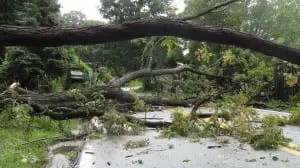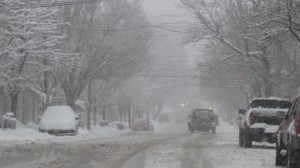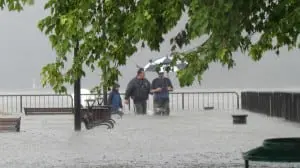Residents encouraged to prepare emergency kits
By Michael Turton
Hurricane Sandy. Hurricane Irene. The Halloween snowstorm. All three are still vividly etched in the memory of local residents. Each created public hazards and caused significant disruption to daily life. And, if climate experts are to be believed, severe storms will be more frequent in years ahead. A small committee of the Village of Cold Spring is working to ensure that the next time Mother Nature throws us a curve, people will be ready.
The Emergency Preparedness Committee met Monday, Aug. 26, in an ongoing effort to plan for such emergencies as floods, long-term power outages, serious storms – or even a train derailment. Mayor Ralph Falloon and Trustee Stephanie Hawkins sit on the committee along with a small group of residents who live west of the railroad tracks in Cold Spring, an area very susceptible to flooding. Karen Dunn and Frank Haggerty represented residents at Monday’s meeting.
The committee has no formal mission statement, but Dunn described its purpose succinctly, saying that when the next emergency hits, “We want to be better prepared – as individuals and as a village.”
Who lives where – especially those with special needs?
The need for emergency workers and first responders to know who lives where, and what their specific needs are, was identified as a priority – and a registry for residents west of the tracks, and possibly for the entire village, is being considered. Information collected will be added to the Putnam County Bureau of Emergency Services database.

“In a distinct area like that, (west of the tracks) it makes sense,” Falloon said. A key requirement for village officials and responders is to know which residents have special needs – such as being on oxygen or confined to a wheelchair. “It’s absolutely important to know that,” said Falloon, who works as a full-time firefighter in Connecticut and also serves as a part-time emergency response coordinator for Putnam County Bureau of Emergency Services.
He said that residents with special needs can choose not to evacuate during an emergency, but that with detailed information available, responders can check on the their status upfront. “We can go in early … we know what they need,” he said. “But I really don’t think the village should get into mandatory evacuation.”
Emergency kits, shelters and local laws
Dunn is heading up a project to encourage residents to have a 72-hour emergency kit ready at all times, a strategy advocated by the American Red Cross. Kits typically include such items as flashlights and extra batteries, personal hygiene items, medications, water and non-perishable foods. A supply of cash is also recommended in the event that banks are forced to close or ATMs are down due to power outages. Families are also advised to designate an emergency meeting place in the event that access to their home is cut off.

Asked by The Paper if the village has a designated emergency shelter, Falloon said that it does not, and that the term “shelter” can be a legal can of worms, since “shelters” are required to have security and medical personnel. Instead, Falloon said that a “warming center” could be considered. “Most people just want a place to warm up, have a coffee and recharge their (electronic devices.)” He also suggested that Cold Spring’s bed and breakfasts be considered as possible facilities for short-term emergency housing.
Hawkins wondered if a local law requiring residents to register their emergency information is needed. Haggerty thought not, stating, “It’s easier to start with voluntary participation … if we can’t proceed then we go to the next step.” Falloon agreed that a law is not called for. “We’re not going to have a New Orleans-style storm where we absolutely can’t get to people,” he said. “And you do want to leave some responsibility to homeowners.” The committee will develop a notification system to get necessary information to all affected residents.
Sandbags, flooded basements and gawkers
Falloon said that a conversation is also needed around two issues that have been problematic in the past – the village’s role in the provision of sandbags and the pumping of flooded basements by the Cold Spring Fire Company. Citing the need for a policy on sandbag distribution, he asked, “Do we provide the bags, the sand, and do we have to fill them? Everyone needs to know the policy.”
One idea put forward is to recruit Haldane High School students or members of local organizations such as the Lion’s Club to fill sandbags. On the topic of flooded basements, Falloon said that fire companies today, “ … focus more on true emergencies.” He said that basement floodwaters threatening storage boxes or a furnace may constitute an emergency to the home owner – but may not rise to the level of a true emergency in the eyes of the fire company.

Gawkers were also on the committee’s mind. Falloon said that residents of the upper village often want to go down to lower Main Street during emergency situations to see what is going on – despite flood and electrical hazards. Dunn suggested that at times gawkers also get in the way of cleanup efforts.
She also said that the ability to turn off electrical power to lower Main Street during emergencies has been a problem in the past. During the Halloween snow storm she said the switch was frozen making it impossible to turn off the power. Central Hudson will be contacted to clarify procedures.
The committee will meet again in two or three weeks but a date was not set. Meetings are posted on the home page of the Village of Cold Spring website, coldspringny.gov.
Photos by M. Turton

